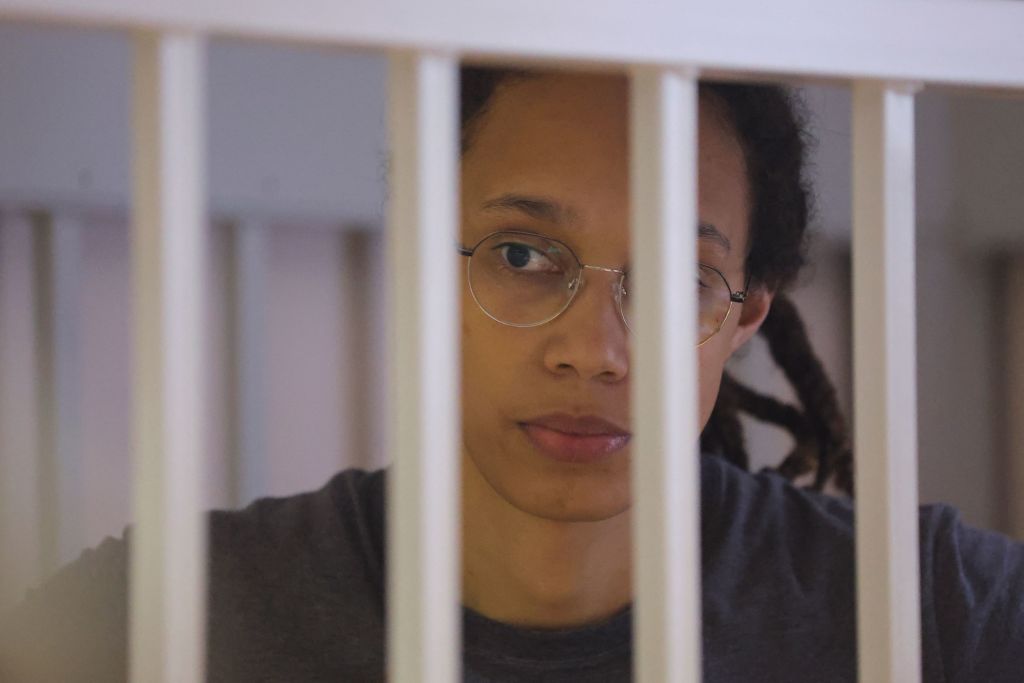Viewed from a coldly logical perspective, releasing Viktor Bout for Brittney Griner is a highly lopsided trade in favor of the Russians. The former was one of the world’s most prolific arms dealers on earth, a man responsible for sending weapons to some of Africa’s deadliest conflicts during the 1990s and early 2000s. The latter was a basketball player who was arrested for a smidgen of cannabis oil in her luggage.
The two offenses are incomparable, which is one of the reasons why conservatives were so upset about President Biden green-lighting the swap. Donald Trump and John Bolton don’t agree on much, but both believe the decision was the epitome of feckless surrender (for Griner’s family, of course, it’s anything but). The Justice Department opposed releasing Bout as well (though it should be noted that the DOJ rejects prisoner exchanges as a matter of principle).
Like most issues in America nowadays, the Bout-Griner swap has become yet another front in the nonstop political and culture wars. According to a survey by Morning Consult, 69 percent of Republicans oppose the deal, while 64 percent of Democrats support it. In other words, for a significant section of the American population, keeping Bout behind bars (he was scheduled to be released in 2029) was more important than getting Griner home free.
Griner’s case, however, isn’t an anomaly. The US has engaged in many prisoner releases over the years, and a good portion of them have been controversial, involving the suspension of sentences for murderers, drug traffickers, and other undesirables. This is what makes prisoner releases so difficult: there will inevitably be a backlash. It’s a damned if you do, damned if you don’t decision: get an American back to his or her family while watching a convicted criminal short-circuit justice, or keep that criminal in prison while watching an American family try to carry on without a loved one.
This isn’t the first prisoner release of Biden’s presidency, and it’s unlikely to be the last. This past April, the Biden administration traded Konstantin Yaroshenko for American Trevor Reed, a former Marine who was tried and sentenced to nine years in prison for endangering the lives of police officers. Yaroshenko was sentenced to 20 years in 2011 for conspiring to import cocaine into the United States, and was part of an international drug smuggling operation that sought to turn Liberia into a key cocaine transshipment point. The US District Court for Southern New York stated that the Russian pilot sent thousand-kilo shipments of cocaine throughout South America, Africa, and Europe. Yet when it came down to it, the benefits of getting an American out of a Russian jail were deemed higher than the costs of cutting short Yaroshenko’s prison term. As an administration official said at the time, “This is a tough call for a president.”
Another tough call came in October, when the administration had an opportunity to finally end the years-long ordeal of six Americans detained by the Venezuelan government. In 2017, the six men, who were executives at Citgo (the group was known as the “Citgo 6”), were summoned to an urgent business meeting in Caracas with the parent company, Petroleos de Venezuela, S.A. (PDVSA). When the men arrived, they were arrested by Venezuelan security forces and charged with corruption. Each was found guilty in 2020 and sentenced to terms ranging from eight to 13 years.
US officials have always viewed the arrests as a concerted campaign by Venezuelan President Nicolás Maduro to acquire leverage over Washington. It’s not a coincidence that the Citgo 6 ordeal occurred at a time when US-Venezuelan relations were at their most heated in decades. In 2019, the US and dozens of other countries recognized Maduro’s opponent, Juan Guaido, as the legitimate representative of the Venezuelan people, and accelerated a sanctions campaign against Venezuela’s oil industry, the lifeblood of the nation’s economy. Detaining Americans was an easy way for Maduro to demonstrate to Washington that pain begets pain.
Even so, allowing six Americans to rot in a Venezuelan prison isn’t a good look for any president. Biden eventually came to an agreement with Caracas: the Citgo 6 for two Venezuelans, Franqui Francisco Flores de Freitas and Efrain Antonio Campo Flores, nephews of Venezuela’s first lady, who had been sentenced to 18 years for conspiring to send cocaine into the United States. Just like the Griner case, the US decided to swap people with very serious criminal records for Americans whose supposed offenses were highly suspect.
A similar arrangement will have to be made if the US has any chance of getting back Paul Whelan, who was arrested by Russia’s FSB in a Moscow hotel in 2018 and sentenced to 16 years for espionage. The White House tried to persuade the Russians to include Whelan in the Griner swap, but Moscow refused. Whether or not Whelan is actually a spy is irrelevant, for the Russians are treating him as one anyway. Any swap for Whelan will likely have to include a Russian spy in American or allied custody, even if the US regards Russia’s claims about the former Marine as ridiculous.
At least 153 Americans are being held abroad on bogus charges. More deals like Griner’s are soon to come.

























